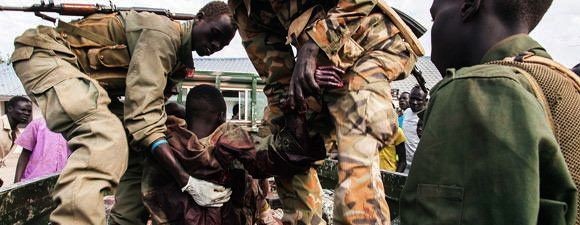An attack carried out by rebels in Kalthok village in Awerial County last week allegedly resulted in the killing of 7 civilians and wounding of 11 others as well as massive displacement of local residents.
Fighting in the county in eastern Lakes State last week caused aid workers to flee by road to Yirol, where they stayed for several days awaiting onward evacuation to Juba or return to Awerial. The state had hitherto been largely untouched by clashes as seen elsewhere in the country.
It is thought that the fighting involved defected soldiers who had been hiding in Central Equatoria State north of Juba and then started to make their way north to rebel-held parts of Unity State when they encountered resistance from local security forces in Kalthok area on 22 January.
Speaking to Radio Tamazuj on Tuesday, Awerial area native Abraham Awolich said that the attack led many people to flee Kalthok area and seek refuge in Kamina area or other parts of the bush. He said where he went in Kalthok area there were 7 civilians killed and 11 wounded.
Awolich, a member of South Sudan’s only thinktank the Sudd Institute, confirmed also that he had witnessed a number of houses burnt down in two villages and properties lost by some citizens in the attack. Among those affected by the violence are residents of the area (‘host community’) as well as refugees from the Bor area who were already living under trees with almost nothing, owing to their flight from Jonglei State last month.
During the three days he was in the area, Awolich saw some people returning home but others still staying in the forests. He also said the aid organizations in the area are doing what they can to assist the displaced, but their intervention is insufficient. There are several organizations working in the county including MSF, Non-Violent Peace Force and ACTED, with the aid effort based mainly at Minkamen.
In the days following the fighting last week, local officials refused aid workers permission to evacuate in UN helicopters. The situation was resolved over the weekend and they were finally allowed to leave.
Meanwhile, a doctor working for Sudan Medical Care, a non-governmental organization that was operating in four payams of Bor area before the conflict, says that there are not enough drugs for all the displaced people in the area. After the fighting in Jonglei, the medical organization shifted its services across the river into Lakes State, where the civilian population fled.
Speaking to Radio Tamazuj in Gualyar, a payam of Awerial County, the doctor said “I am using just the few drugs which were brought from Juba, but those drugs were not enough to serve the people. Currently now I have no drugs now. The drugs which were brought were finished. The situation now is very bad.”
He also pointed that there is an outbreak of measles, but not a very bad one, saying that he found four cases of suspected measles. “I checked these cases three days back,” he said Tuesday.
Photo: A Sudan People’s Liberation Army (SPLA) soldier, who was wounded in renewed fighting, arrives for medical attention at a clinic in the IDP camp in Minkamen, Awerial, 22 January 2014 (Reuters/Adriane Ohanesian)
Related coverage: South Sudan officials block evacuation of aid workers from Lakes State (25 Jan.)




